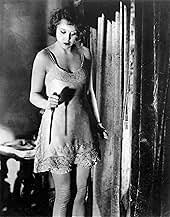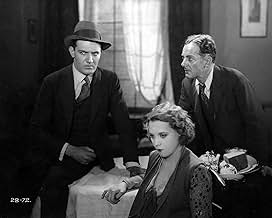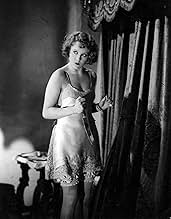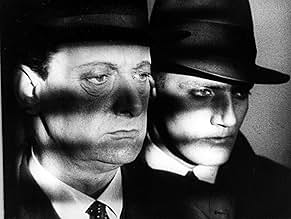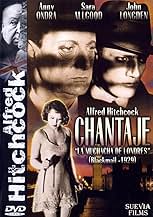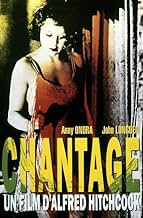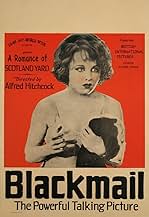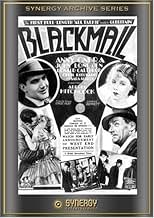After killing a man in self-defense, a young woman is blackmailed by a witness to the killing.After killing a man in self-defense, a young woman is blackmailed by a witness to the killing.After killing a man in self-defense, a young woman is blackmailed by a witness to the killing.
- Awards
- 2 wins
Ex-Det. Sergt. Bishop
- The Detective Sergeant
- (as Ex-Det. Sergt. Bishop - Late C.I.D. Scotland Yard)
Johnny Ashby
- Boy
- (uncredited)
Joan Barry
- Alice White
- (voice)
- (uncredited)
Johnny Butt
- Sergeant
- (uncredited)
Alfred Hitchcock
- Man on Subway
- (uncredited)
Phyllis Konstam
- Gossiping Neighbour
- (uncredited)
Sam Livesey
- The Chief Inspector (silent version)
- (uncredited)
Phyllis Monkman
- Gossip Woman
- (uncredited)
Percy Parsons
- Crook
- (uncredited)
Storyline
Did you know
- TriviaMuch of this movie was originally shot silently. When sound became available during the course of shooting, Sir Alfred Hitchcock re-shot certain scenes with sound, thus making it his first talkie. There was one complication with this change, however. Leading lady Anny Ondra had a thick Czech accent which was inappropriate to her character, Alice White. Joan Barry was chosen to provide a different voice for her, but post-production dubbing technology did not exist then. The solution was for Barry to stand just out of shot and read Alice's lines into a microphone as Ondra mouthed them in front of the camera. This is generally acknowledged as the first instance of one actress' voice being dubbed by another, even though the word "dub" is technologically inappropriate in this case.
- GoofsWhen Alice "unlocks" the door to the building where she lives, it starts to open as soon as the key reaches the door. It was clearly not only not locked, but not even latched. However, she goes through with the motion of unlocking it.
- Quotes
Alice White: You and your Scotland Yard. If it weren't for Edgar Wallace, nobody'd ever heard of it.
- Alternate versionsOriginally filmed as a silent movie, running 75 minutes; Hitchcock later added newly shot scenes and had other existing footage dubbed to create a talkie version, running 86 minutes.
- ConnectionsEdited into Der Zinker (1931)
- SoundtracksMiss Up-to-Date
(1929) (uncredited)
Words by Frank Eyton and music by Billy Mayerl
Performed by Cyril Ritchard
Featured review
While remembered as the first sound picture made by Alfred Hitchcock (or anyone else in Britain), there is much more to "Blackmail" than merely historical interest. It reveals the director's subtle creativity, with a carefully structured story that also produces some real suspense, with one of Hitchcock's best cameos and an entertaining chase sequence as bonuses. The movie has a unique feel, as Hitchcock was still using many silent film techniques at the same time that he was experimenting with sound. Not all of this works perfectly, but it does not detract from the film's many positive features.
Alice White (Anny Ondra, voice dubbed by Joan Barry) goes out for the evening with her boyfriend, who is a police detective (John Longden). When they have a series of minor quarrels, Alice decides to go her own way, and meets an artist friend. The artist's intentions are obvious, but Alice is innocently unaware. When he brings her to his studio, there is soon an unpleasant confrontation that sets in motion a turbulent series of events.
The story is carefully constructed not just to produce suspense but also to raise interesting questions in the viewer's mind. Alice feels a terrible sense of guilt and fear over what has happened - communicated to the viewer in a variety of creative ways - but of what is she really guilty? The behavior of the detective boyfriend is partly well-intentioned, but he certainly is not faultless. The moral ambiguity is often subtle, because it takes a back seat to the suspense, and it takes a couple of viewings to appreciate all that is going on.
There is a particularly nice symmetry to the beginning and ending, pointing to the greater significance of the action in between. The opening sequence (filmed in silent movie style) shows the detective and his partner dealing with a suspect in a routine way, not caring about him as a person. In the final scenes, when the detective must help Alice make a final report on everything that has happened, he sees his job in a far different perspective.
"Blackmail" is of the darker type of Hitchcock, like "Notorious" or "Vertigo". While clearly made in a different era, it has the same kind of depth and craftsmanship that distinguished those later, more well-known masterpieces.
Alice White (Anny Ondra, voice dubbed by Joan Barry) goes out for the evening with her boyfriend, who is a police detective (John Longden). When they have a series of minor quarrels, Alice decides to go her own way, and meets an artist friend. The artist's intentions are obvious, but Alice is innocently unaware. When he brings her to his studio, there is soon an unpleasant confrontation that sets in motion a turbulent series of events.
The story is carefully constructed not just to produce suspense but also to raise interesting questions in the viewer's mind. Alice feels a terrible sense of guilt and fear over what has happened - communicated to the viewer in a variety of creative ways - but of what is she really guilty? The behavior of the detective boyfriend is partly well-intentioned, but he certainly is not faultless. The moral ambiguity is often subtle, because it takes a back seat to the suspense, and it takes a couple of viewings to appreciate all that is going on.
There is a particularly nice symmetry to the beginning and ending, pointing to the greater significance of the action in between. The opening sequence (filmed in silent movie style) shows the detective and his partner dealing with a suspect in a routine way, not caring about him as a person. In the final scenes, when the detective must help Alice make a final report on everything that has happened, he sees his job in a far different perspective.
"Blackmail" is of the darker type of Hitchcock, like "Notorious" or "Vertigo". While clearly made in a different era, it has the same kind of depth and craftsmanship that distinguished those later, more well-known masterpieces.
- Snow Leopard
- May 31, 2001
- Permalink
Details
Box office
- Gross worldwide
- $160
- Runtime1 hour 25 minutes
- Color
- Aspect ratio
- 1.20 : 1
Contribute to this page
Suggest an edit or add missing content


